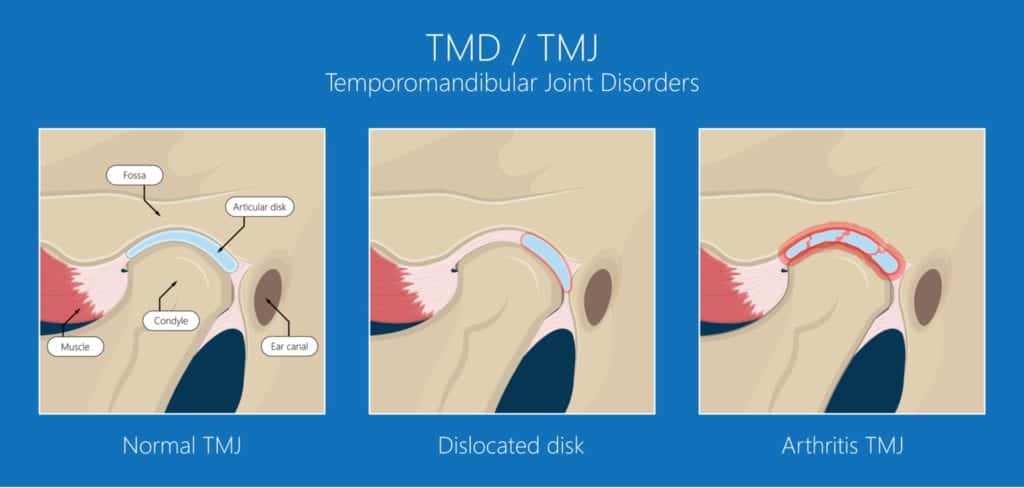Your temporomandibular joints or TMJ connect your lower jawbone to your skull. These joints help make sure that you are able to speak, chew, swallow and yawn comfortably. Therefore, it can significantly affect the quality of your life if you start feeling pain in and around these joints.
Persistent pains in and around your TMJ are usually due to Temporomandibular Disorder or TMD. The most common symptoms of this disorder, apart from aches around the TMJ, are:
- Pain, ringing, or stuffiness in the ears and, at times, even hearing loss
- Frequent headaches or neck aches that radiate down the shoulders and upper back
- Clicking or popping sound when the jaw moves especially when talking, chewing and yawning
- Dizziness
- Swelling on the sides of the face as well as scalp pain or sensitivity
- Muscle spasms in the jaw area
- A change in the alignment of top and bottom teeth
- Locked jaw or difficulty in opening the mouth/restricted jaw movement
- Nausea and/or vomiting
If you have been experiencing any of these symptoms, we encourage you to schedule an appointment to see us right away. Our dentists in Farmington Hills and Livonia can help establish the presence of TMD and create an appropriate treatment program for your unique case.

At Laurich Dentistry, we deliver gentle, compassionate dental care that helps each patient achieve and maintain exceptional oral health and a beautiful smile. We also build long-term relationships with those we treat.
But while you’re waiting for your appointment with us, we have here a collection of helpful tips that you can implement in order to either prevent TMD from occurring or to help you manage the discomforts that the disorder is creating for you.
- Calm down when you feel pain. Breathe in a steady manner and then relax your face. As you do this, continuously repeat this instruction to yourself: “Lips together, teeth apart.”
- Exercise your jaw every now and then. We can recommend you some exercise examples that will help with flexibility.
- Massage your jaw, too. There are simple massages that can ease the tightness and pain you feel in and around your TMJ.
- If you suffer from bruxism, change your sleeping position and ask us what mouth guard or sleeping aid you can use to help you stop grinding your teeth.
- Avoid frequent gum chewing; this can be quite a workout for the jaw.
- Don’t cradle the phone receiver between your head and shoulder because this is a very stressful position for the jaw; instead, use a headset or simply hold the receiver in your hand.
- Chew food evenly on both sides of your mouth.
- Maintain good posture at all times; keep your head up, your shoulders back, and your back straight.
- Avoid resting your chin on your hand.
Dr. Dale Flanagin II is a distinguished professional in the field of dentistry, holding a Bachelor’s degree in Molecular Biology and Biotechnology as well as a Doctor of Dental Surgery degree. He is committed to improving the lives of others through his work, driven by a lifelong passion for helping people.





